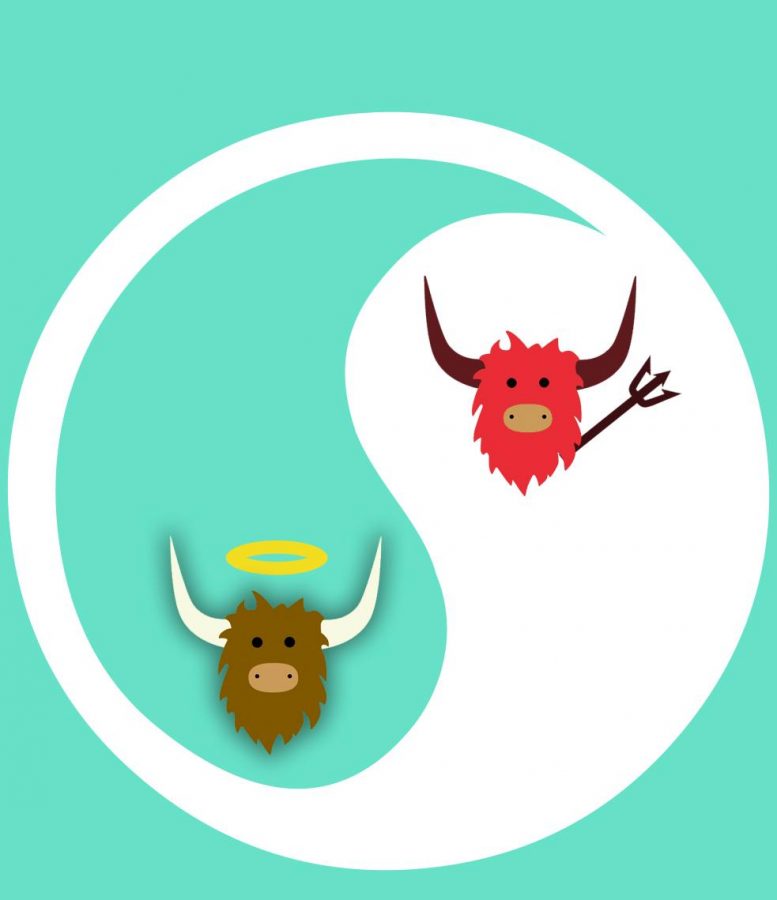OPINION: Three hours of anonymity show an unflattering mirror
‘Yik-Yak’ showed students at their worst
BP Graphic by Gabe Silverstein
WINNER: Gabe Silverstein’s depiction of student behavior with the Yik-Yak app won first prize for digital editorial cartoons.
December 15, 2014
Shalhevet students are supposed to be different from other high school students — after all, no other school teaches moral development from the first day of freshman year. But behind a cloak of anonymity, it turned out this week that Shalhevet students can be just as abominable as other teenagers.
Using an app called Yik Yak, which allows users within a five-mile radius “zone” to anonymously post and comment, on Monday morning students began writing extremely crass and hurtful comments about others. The app was introduced to the school that day by Firehawk debaters returning from the previous week’s Princeton Model Congress convention, and beginning at lunch, it spread like wildfire in just a few hours.
Since it was impossible to know who wrote what, students felt very comfortable posting without worrying about the repercussions in what became an escalating contest of insult and vulgarity. Although some of the posts were funny—such as the one praising the bagels sold at school every morning—many were extremely offensive, hurtful, and embarrassing. Posts used explicit language, maliciously ridiculed students and teachers, and even discussed the sizes of students’ male anatomies. Starting and ending the same day, the episode lasted about three hours, from lunch until everyone convened for Mincha, the afternoon prayer service, at 3.
During Mincha, Head of School Rabbi Segal came to speak to the student body to tell them he was extremely disappointed in their un-Shalhevet-like behavior. Crying, he told those who enjoyed writing the offensive posts that they didn’t belong at our school.
Then Principal Reb Weissman asked the students a question, perhaps meant to be rhetorical: “Do any of you feel oppressed in this environment?” With its Just Community constitution, weekly Town Halls, Fairness Committee, Advisory periods and SWAP?
A few minutes after that, General Studies Principal Mr. Danovitch stood and preached the oft-recited Shalhevet gospel that we must be moral examples, always. He told us we should suppress our urges to engage in slanderous gossip on anonymous internet applications like Yik Yak, and even tell our friends to refrain.
Well, Reb Weissman, there is your answer: Yes, we are oppressed, in the sense that we need to bury our worst urges. Adhering to Mr. Danovitch’s ideal is an aspiration that Shalhevet’s students share, but by definition it means we have to suppress certain immoral and disrespectful desires.
In other words, we have to be careful, just like everybody else. Now, post-Yik Yak, we know that we are still teenagers and do not automatically live up to the standard of greatness we study and strive for.
We should not have acted as we did, and we know that – Rabbi Segal’s tears made that abundantly clear. But maybe this is a time where we don’t need external punishments like “no phones allowed” or schoolwide detentions, as some have suggested. The Boiling Point believes what we need – and doubtlessly feel – is a self-imposed, internal punishment.
Yes, we are teenagers. Yes, we need outlets so that we can be better people at other times. Of course, we need more healthy and appropriate outlets though – outlets that don’t hurt people —and we should collectively find those outlets.
This is a time to step out of the spotlight, and, as Rabbi Segal put it, look into the mirror. We’ve just been reminded that we’re not always awesome, and not everything is “Love it!!!”
Before we hang our next medal on the wall, we need to be sure we are human beings – not just students, thespians or athletes – deserving that medal.













